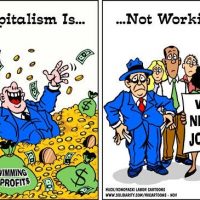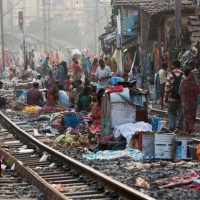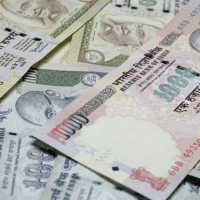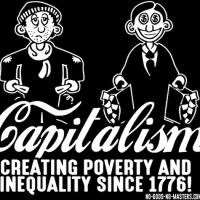-
The Yellow Vest movement
Nothing shows the crisis of neo-liberal capitalism more clearly than the popular uprising in France that is occurring under the banner of the “Yellow Vest” movement.
-
Contemporary capitalism and the world of work
The most significant feature of contemporary capitalism which is of relevance to the world of work is its inability to provide work to a substantial proportion of persons looking for it.
-
Vilifying the intelligentsia
NARENDRA Modi said the other day, rather disparagingly, that the “Urban Naxals” live in air-conditioned comfort. Since all who speak or write in public upholding the right to dissent from the Hindutva positions, including even known critics of the Left, which means virtually all members of the intelligentsia who display any integrity, have been dubbed “Urban Naxals” by his government, his remark in effect amounts to targeting the entire intelligentsia.
-
Neo-Liberalism and the diffusion of development
Capitalism in short was the panacea for mass poverty in the third world and not its progenitor as the Marxists had been arguing. The crisis that is enveloping the third world economies at present, is putting an end to that claim.
-
The Indian economy in a tailspin
THE Indian economy is in a tailspin. This cannot be attributed only to innocence in economic matters of the command-centre of the NDA government. While that is indubitably a contributing factor, the current travails of the economy point to something deeper, namely the dead-end to which neo-liberalism has brought the economy.
-
Dossier 7: The imperialism of finance capital and ‘trade wars’
Trump wants to resolve the crisis for America, caused by neo-liberalism, within the basic confines of neo-liberalism itself, i.e. without violating its core characteristic, which is free global mobility of finance.
-
In memoriam: Samir Amin
Samir Amin, the renowned Marxist thinker and economist, passed away on August 13 in Paris. Born in Cairo on September 3, 1931, to an Egyptian father and a French mother, he had his initial education in Egypt before moving to Paris where he obtained his doctorate in Political Economy.
-
Capitalism’s discourse on “development”
CAPITALISM’S discourse on “development” which has become quite influential all over the third world in the neo-liberal period proceeds as follows.
-
Why didn’t socialism have over-production crises?
SOCIALISM has collapsed over large tracts of the globe. Where it still exists, the economic regimes have undergone considerable reforms. Not surprisingly therefore the old socialist regimes are objects of much vilification these days.
-
Trump versus the rest
Donald Trump’s leaving the G-7 summit without budging an iota on protectionism is indicative of the disunity among the leading capitalist countries on the strategy to overcome the capitalist crisis.
-
Marx after Marx
On Karl Marx’s 200th Birth Anniversary SFI organised a lecture on Marx After Marx delivered by Prof. Prabhat Patnaik.
-
Capitalism, poverty and praxis
Capitalism is an economic system driven by its own immanent tendencies, which the State that presides over it normally supports, sustains and accelerates.
-
Ashok Mitra: the doyen among Left intellectuals in India
Ashok Mitra who passed away on May1, 2018, was the doyen among Left intellectuals in the country, held in the highest esteem by one and all for his absolute integrity, his outstanding intellect and his commitment to the cause of the working people.
-
Trump’s protectionism
ON March 8, Donald Trump made an announcement which according to many has the potential of starting a global trade war. He announced that the U.S. would be raising tariffs on imported steel by 25 per cent and tariffs on imported aluminium by 10 per cent.
-
Commoditisation and the public sphere
The commoditisation of education which makes it completely incapable of providing students with the wherewithal to engage in any active and worthwhile public discourse, has proceeded apace under the neo-liberal regime.
-
Enclosed thinking
In a slave society, one can argue, the interest of the slaves lies in keeping the slave owner happy, for otherwise he is likely to flog and whip them mercilessly which would cause them great agony. Likewise in a caste society, one can argue, the interest of the Dalit lies in being as inconspicuous as possible, in not ‘polluting’ the upper castes through his presence, for otherwise he is likely to be beaten and lynched.
-
Bubbles, stocks and crashes
WHAT is happening in the U.S. economy provides an object lesson on the functioning of neo-liberal capitalism. Pre-first world war capitalism which had witnessed the long Victorian and Edwardian boom had relied on the colonial arrangement for the system’s dynamics.
-
Marx on imperialism
On February 19, 1881, Karl Marx had written a remarkable letter to N.F. Danielson, the renowned Narodnik economist who had also gone under the name of Nikolayon and whose work had been much discussed by Lenin.
-
Neo-liberal capitalism and its crisis
“Neo-liberal capitalism” is the term used to describe the phase of capitalism where restrictions on the global flows of commodities and capital, including capital in the form of finance, have been substantially removed.
-
The current upsurge of fascism
To describe the present upsurge of fascism as nationalist or populist would be misleading. Neither is it a replication of the fascism of the 1930s. However, it is marked by four features, which have been common to all fascist upsurges in the past, namely: rise of supremacism, apotheosis of unreason, proliferation of fascism as a movement, and intertwining of fascist movement and corporate capital.




















